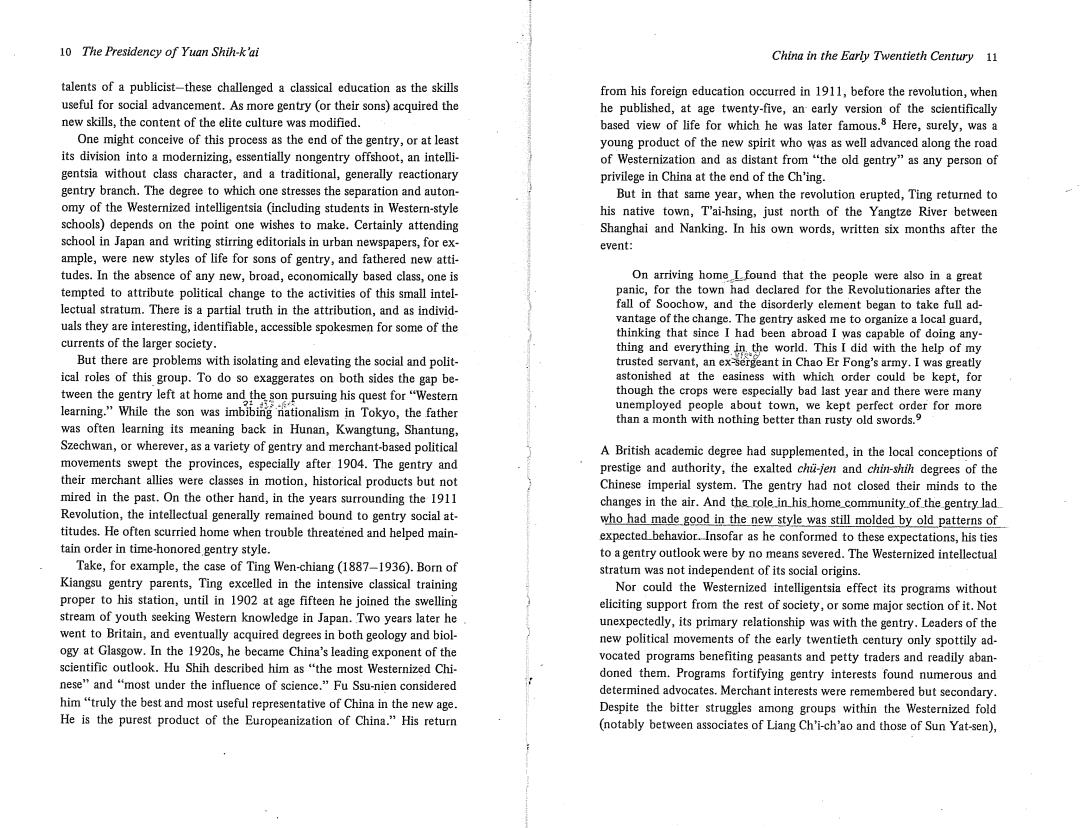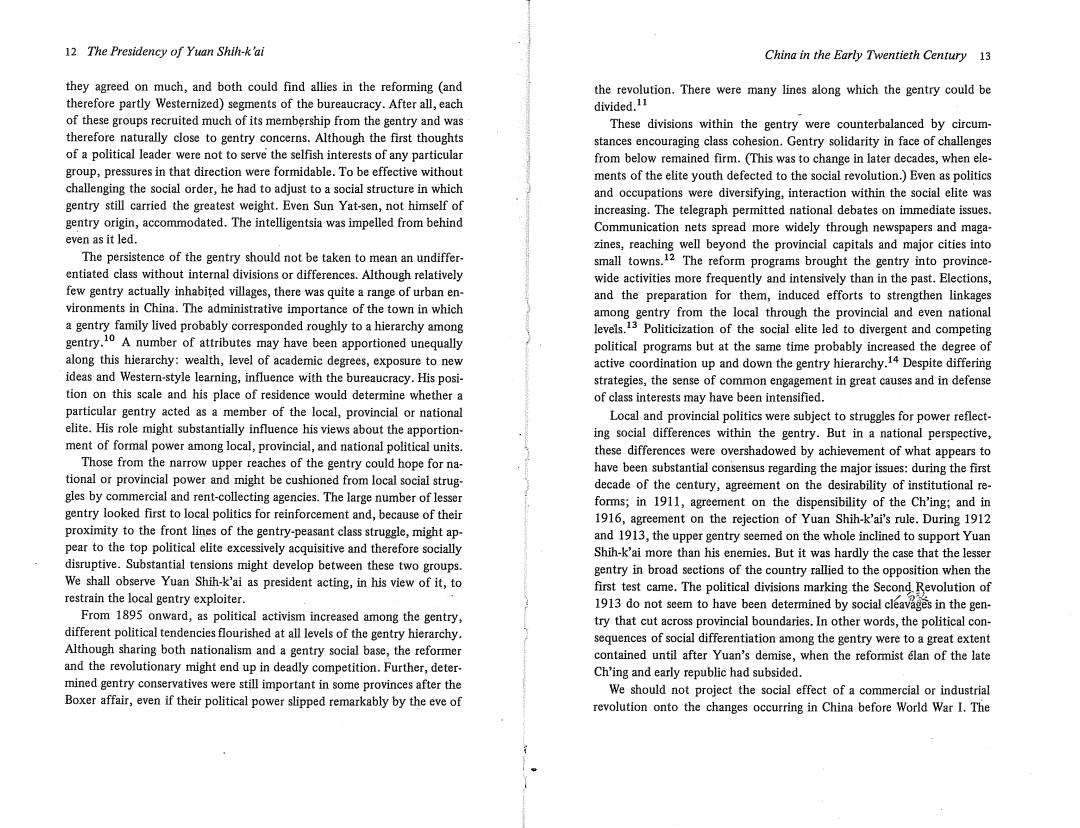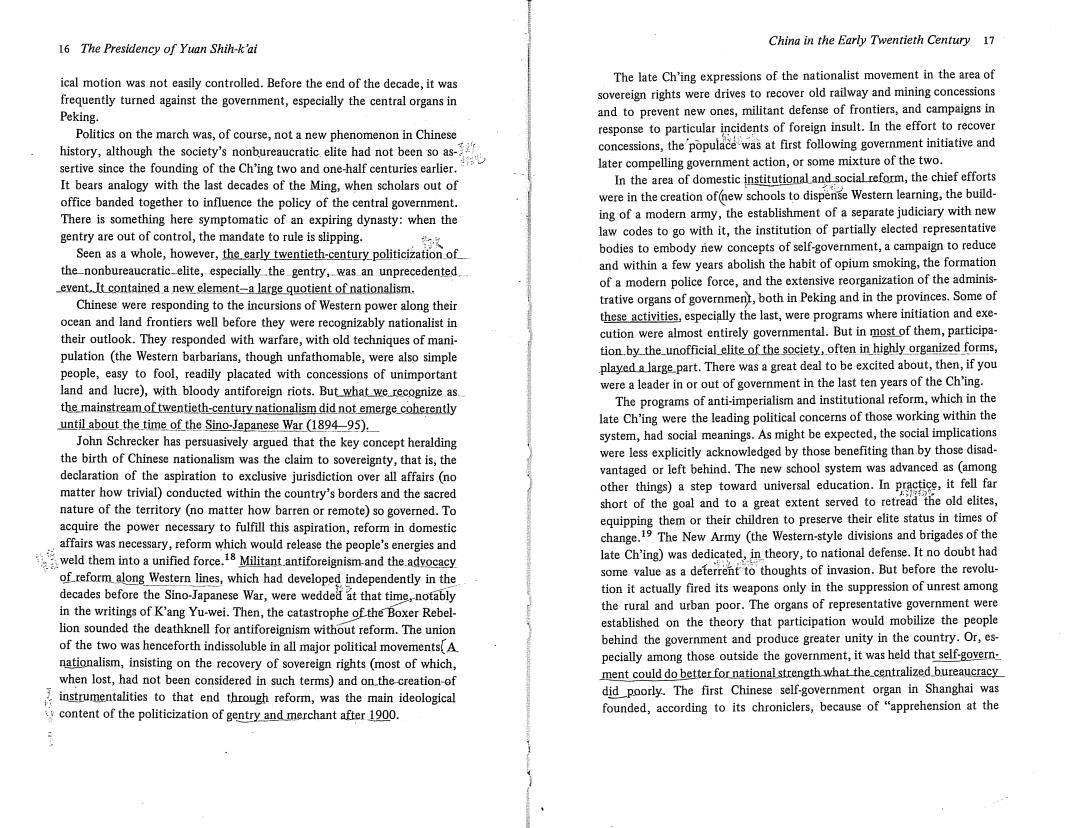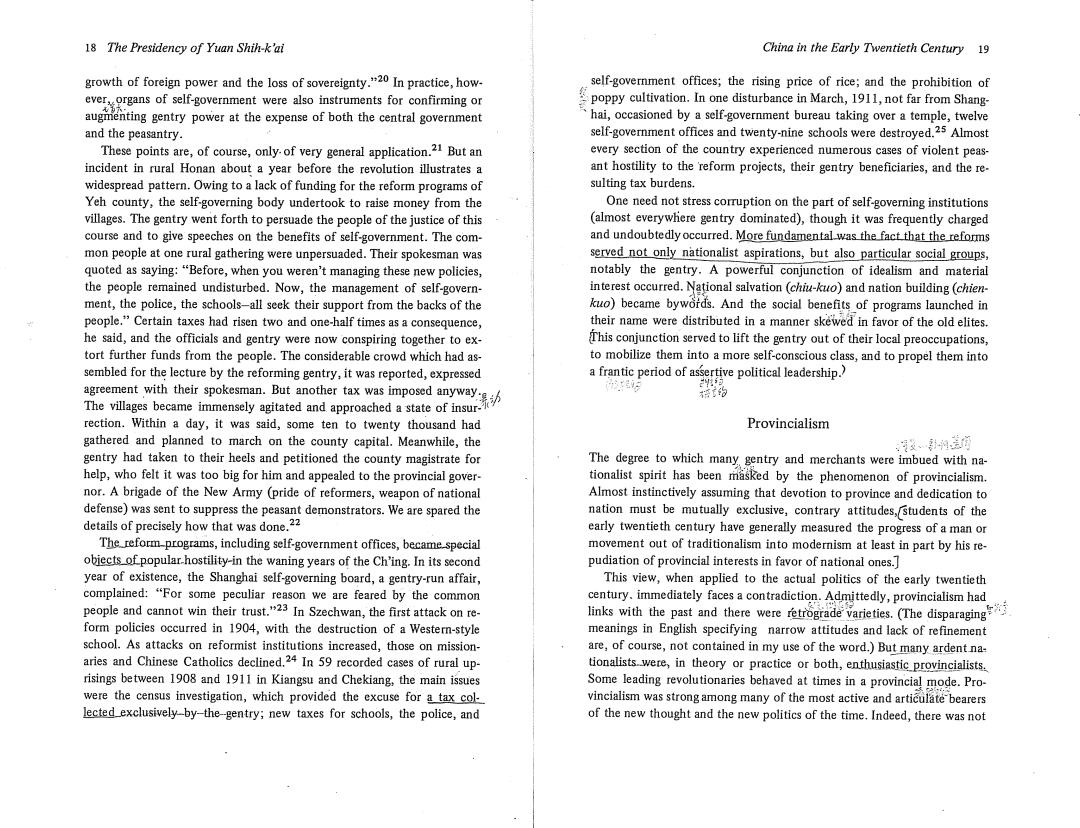
10 The Presidency of Yuan Shih-k'ai China in the Early Twentieth Century 11 talents of a publicist-these challenged a classical education as the skills from his foreign education occurred in 1911,before the revolution,when useful for social advancement.As more gentry (or their sons)acquired the he published,at age twenty-five,an early version of the scientifically new skills,the content of the elite culture was modified. based view of life for which he was later famous.8 Here,surely,was a One might conceive of this process as the end of the gentry,or at least young product of the new spirit who was as well advanced along the road its division into a modernizing,essentially nongentry offshoot,an intelli- of Westernization and as distant from"the old gentry"as any person of gentsia without class character,and a traditional,generally reactionary privilege in China at the end of the Ch'ing. gentry branch.The degree to which one stresses the separation and auton- But in that same year,when the revolution erupted,Ting returned to omy of the Westernized intelligentsia (including students in Western-style his native town,T'ai-hsing,just north of the Yangtze River between schools)depends on the point one wishes to make.Certainly attending Shanghai and Nanking.In his own words,written six months after the school in Japan and writing stirring editorials in urban newspapers,for ex- event: ample,were new styles of life for sons of gentry,and fathered new atti- tudes.In the absence of any new,broad,economically based class,one is On arriving home I found that the people were also in a great tempted to attribute political change to the activities of this small intel- panic,for the town had declared for the Revolutionaries after the lectual stratum.There is a partial truth in the attribution,and as individ- fall of Soochow,and the disorderly element began to take full ad- uals they are interesting,identifiable,accessible spokesmen for some of the vantage of the change.The gentry asked me to organize a local guard, thinking that since I had been abroad I was capable of doing any- currents of the larger society. thing and everything in the world.This I did with the help of my But there are problems with isolating and elevating the social and polit- trusted servant,an ex-sergeant in Chao Er Fong's army.I was greatly ical roles of this group.To do so exaggerates on both sides the gap be- astonished at the easiness with which order could be kept,for tween the gentry left at home and the son pursuing his quest for"Western though the crops were especially bad last year and there were many learning."While the son was imbibing nationalism in Tokyo,the father unemployed people about town,we kept perfect order for more was often learning its meaning back in Hunan,Kwangtung,Shantung, than a month with nothing better than rusty old swords.9 Szechwan,or wherever,as a variety of gentry and merchant-based political A British academic degree had supplemented,in the local conceptions of movements swept the provinces,especially after 1904.The gentry and prestige and authority,the exalted chii-jen and chin-shih degrees of the their merchant allies were classes in motion,historical products but not Chinese imperial system.The gentry had not closed their minds to the mired in the past.On the other hand,in the years surrounding the 1911 changes in the air.And the role in his home community of the gentry lad Revolution,the intellectual generally remained bound to gentry social at- who had made good in the new style was still molded by old patterns of titudes.He often scurried home when trouble threatened and helped main- expected behavior.Insofar as he conformed to these expectations,his ties tain order in time-honored gentry style. to a gentry outlook were by no means severed.The Westernized intellectual Take,for example,the case of Ting Wen-chiang(1887-1936).Born of stratum was not independent of its social origins. Kiangsu gentry parents,Ting excelled in the intensive classical training Nor could the Westernized intelligentsia effect its programs without proper to his station,until in 1902 at age fifteen he joined the swelling eliciting support from the rest of society,or some major section of it.Not stream of youth seeking Western knowledge in Japan.Two years later he unexpectedly,its primary relationship was with the gentry.Leaders of the went to Britain,and eventually acquired degrees in both geology and biol- new political movements of the early twentieth century only spottily ad- ogy at Glasgow.In the 1920s,he became China's leading exponent of the vocated programs benefiting peasants and petty traders and readily aban- scientific outlook.Hu Shih described him as "the most Westernized Chi- doned them.Programs fortifying gentry interests found numerous and nese"and "most under the influence of science."Fu Ssu-nien considered determined advocates.Merchant interests were remembered but secondary. him"truly the best and most useful representative of China in the new age. Despite the bitter struggles among groups within the Westernized fold He is the purest product of the Europeanization of China."His return (notably between associates of Liang Ch'i-ch'ao and those of Sun Yat-sen)

12 The Presidency of Yuan Shih-k'ai China in the Early Twentieth Century 13 they agreed on much,and both could find allies in the reforming (and the revolution.There were many lines along which the gentry could be therefore partly Westernized)segments of the bureaucracy.After all,each divided.11 of these groups recruited much of its membership from the gentry and was These divisions within the gentry were counterbalanced by circum- therefore naturally close to gentry concerns.Although the first thoughts stances encouraging class cohesion.Gentry solidarity in face of challenges of a political leader were not to serve the selfish interests of any particular from below remained firm.(This was to change in later decades,when ele- group,pressures in that direction were formidable.To be effective without ments of the elite youth defected to the social revolution.)Even as politics challenging the social order,he had to adjust to a social structure in which and occupations were diversifying,interaction within the social elite was gentry still carried the greatest weight.Even Sun Yat-sen,not himself of increasing.The telegraph permitted national debates on immediate issues. gentry origin,accommodated.The intelligentsia was impelled from behind Communication nets spread more widely through newspapers and maga- even as it led. zines,reaching well beyond the provincial capitals and major cities into The persistence of the gentry should not be taken to mean an undiffer- small towns.12 The reform programs brought the gentry into province- entiated class without internal divisions or differences.Although relatively wide activities more frequently and intensively than in the past.Elections, few gentry actually inhabited villages,there was quite a range of urban en- and the preparation for them,induced efforts to strengthen linkages vironments in China.The administrative importance of the town in which among gentry from the local through the provincial and even national a gentry family lived probably corresponded roughly to a hierarchy among levels.13 Politicization of the social elite led to divergent and competing gentry.10 A number of attributes may have been apportioned unequally political programs but at the same time probably increased the degree of along this hierarchy:wealth,level of academic degrees,exposure to new active coordination up and down the gentry hierarchy.14 Despite differing ideas and Western-style learning,influence with the bureaucracy.His posi- strategies,the sense of common engagement in great causes and in defense tion on this scale and his place of residence would determine whether a of class interests may have been intensified. particular gentry acted as a member of the local,provincial or national Local and provincial politics were subject to struggles for power reflect- elite.His role might substantially influence his views about the apportion- ing social differences within the gentry.But in a national perspective, ment of formal power among local,provincial,and national political units. these differences were overshadowed by achievement of what appears to Those from the narrow upper reaches of the gentry could hope for na- have been substantial consensus regarding the major issues:during the first tional or provincial power and might be cushioned from local social strug- decade of the century,agreement on the desirability of institutional re- gles by commercial and rent-collecting agencies.The large number of lesser forms;in 1911,agreement on the dispensibility of the Ch'ing;and in gentry looked first to local politics for reinforcement and,because of their 1916,agreement on the rejection of Yuan Shih-k'ai's rule.During 1912 proximity to the front lines of the gentry-peasant class struggle,might ap- and 1913,the upper gentry seemed on the whole inclined to support Yuan pear to the top political elite excessively acquisitive and therefore socially Shih-k'ai more than his enemies.But it was hardly the case that the lesser disruptive.Substantial tensions might develop between these two groups. gentry in broad sections of the country rallied to the opposition when the We shall observe Yuan Shih-k'ai as president acting,in his view of it,to first test came.The political divisions marking the Second Revolution of restrain the local gentry exploiter. 1913 do not seem to have been determined by social cleavages in the gen- From 1895 onward,as political activism increased among the gentry, try that cut across provincial boundaries.In other words,the political con- different political tendencies flourished at all levels of the gentry hierarchy. sequences of social differentiation among the gentry were to a great extent Although sharing both nationalism and a gentry social base,the reformer contained until after Yuan's demise,when the reformist elan of the late and the revolutionary might end up in deadly competition.Further,deter- Ch'ing and early republic had subsided. mined gentry conservatives were still important in some provinces after the We should not project the social effect of a commercial or industrial Boxer affair,even if their political power slipped remarkably by the eve of revolution onto the changes occurring in China before World War I.The

14 The Presidency of Yuan Shih-k'ai China in the Early Twentieth Century 15 fact that the broad outlines of the economic and social structures had not origin.But these characteristic activities of the late empire,both gentry changed had political meaning.The gentry continued through its educa- and merchant,were limited to a very narrow conception of the proper tion and its lien on the agricultural product to be in the best position to sphere of concern.Politics broadly conceived was not precisely a govern- exploit the new opportunities that change was bringing.Moreover,it had ment monopoly,but the arena in which those outside the bureaucracy not lost its historical self-image as the natural font of leadership.Wealthy were allowed to exercise leadership was small.Handling large issues,which city-based merchants had good opportunities to participate in the new affected a province,region,or whole class,was,before the 1890s,exclu- movements,but their numbers and prestige in most parts of the country sively the prerogative of the emperor and his servitors.Even within the were insufficient to compete with the socia force of the gentry5 Outside bureaucracy,the channels of communication on a particular subject might the handful of large commercial centers,where participation was shared be closed.16 with the commercial class,most leadership as well as support for the vari- Philip Kuhn has shown how gentry were entrusted with local adminis- ety of political movements in the late Ch'ing and early republic was im- trative powers in the mid-nineteenth century in certain regions.What be- bedded in or was recently connected with the gentry class.There were gan as a military response to the Taiping Rebellion become extended to some important exceptions,which will be noted,but in general this shared tax collecting and police authority.Kuhn suggests that this enhancement characteristic cut across the diversity of politics. of the local power of the social elite was the practical basis for the institu- tion of local self-government in the early twentieth century,which legiti- mized what had been customary functions for many years.17 The mid- Political Movement in the Late Ch'ing nineteenth-century growth of local unofficial powers,particularly if they can be shown to have persisted to the end of the century,helps-explain the Although the dominance of an agriculturally based,urban-dwelling,classi- energy and confidence with which the gentry took matters into their own cally educated gentry persisted into the twentieth century,some of its hands later on.But,until their powers were enlarged to allow for political roles and attitudes,and those of merchants in a few large urban centers, organization beyond the locality,throughout their social class,and for were startlingly new.What was radical and confined to a few in the abortive breaking down the political insulation of the county or region,the gentry 1898 reform movement became ordinary and widespread.Reform,resis- as a class were still at a disadvantage before central government power. tance to foreign incursions,national sovereignty,self-government-these With the crisis of confidence indticed'by the defeat by Japan in 1895 slogans became so common that within a few years of the turn of the cen- and the subsequent Western scramble for concessions,large-scale political tury they were looked on by some intellectuals as platitudes? movement outside the government(short of rebellion)became noticeable The striking features of the new atmosphere were the spread of political for the first time since the end of the Ming dynasty.In Hunan,there were activity and its nationalistic tenor:Gentry,by virtue of their local leader- gentry-led reform societies.In Peking in 1898,K'ang Yu-wei organized an ship,had always had what might be described as a political role in matters extragovernmental association addressing itself to the largest issues beset- affecting the area circumscribed by the extent of their personal social ting the country.Dormant during two years of reaction,the seeds planted power.They were not only extralegal adjudicators of local disputes and by the 1898 reform movement grew astonishingly after the Boxer Rebel- intermediaries between community and government.They also managed lion.Associations to defend the nation,to create a modern school system, or collaborated with officialdom in managing a variety of local good works, to build railways,to develop organs of self-government,to put pressure on such as orphanages,bridge building,schools,and dikes.In the nineteenth foreign governments through boycotts-a whole panoply of movements, century,they became supervisors of local military units.Merchants,par- broadly based in the gentry and merchant elite,flourished with government ticularly in the eighteenth and nineteenth centuries,had organized them- toleration.Indeed,in many cases,the governmental posture was rather selves in protective associations,not only on their home ground,but in that of stimulation and cooperation.Needless to say,this greatly advanced guilds or Landsmannschaften (hui-kuan)in cities far from their place of the enthusiasm and degree of gentry and merchant participation.But polit-

China in the Early Twentieth Century 17 16 The Presidency of Yuan Shih-k'at ical motion was not easily controlled.Before the end of the decade,it was The late Ch'ing expressions of the nationalist movement in the area of frequently turned against the government,especially the central organs in sovereign rights were drives to recover old railway and mining concessions Peking. and to prevent new ones,militant defense of frontiers,and campaigns in Politics on the march was,of course,not a new phenomenon in Chinese response to particular incidents of foreign insult.In the effort to recover history,although the society's nonbureaucratic elite had not been so as- concessions,the populace was at first following government initiative and sertive since the founding of the Ch'ing two and one-half centuries earlier. later compelling government action,or some mixture of the two. It bears analogy with the last decades of the Ming,when scholars out of In the area of domestic institutionaland social reform,the chief efforts office banded together to influence the policy of the central government. were in the creation of new schools to dispense Western learning,the build- There is something here symptomatic of an expiring dynasty:when the ing of a modern army,the establishment of a separate judiciary with new gentry are out of control,the mandate to rule is slipping. law codes to go with it,the institution of partially elected representative Seen as a whole,however,the early twentieth-century politicization of bodies to embody new concepts of self-government,a campaign to reduce the-nonbureaucratic-elite,especially the gentry,was.an unprecedented. and within a few years abolish the habit of opium smoking,the formation event It contained a new element-a large quotient of nationalism. of a modern police force,and the extensive reorganization of the adminis- Chinese were responding to the incursions of Western power along their trative organs of government,both in Peking and in the provinces.Some of ocean and land frontiers well before they were recognizably nationalist in these activities,especially the last,were programs where initiation and exe- their outlook.They responded with warfare,with old techniques of mani- cution were almost entirely governmental.But in most of them,participa- pulation (the Western barbarians,though unfathomable,were also simple tion by the unofficial elite of the society,often in highly organized forms, people,easy to fool,readily placated with concessions of unimportant played a large part.There was a great deal to be excited about,then,if you land and lucre),with bloody antiforeign riots.But what we recognize as. were a leader in or out of government in the last ten years of the Ch'ing. the mainstream of twentieth-century nationalism did not emerge coherently The programs of anti-imperialism and institutional reform,which in the until about the time of the Sino-Japanese War (1894-95). late Ch'ing were the leading political concerns of those working within the John Schrecker has persuasively argued that the key concept heralding system,had social meanings.As might be expected,the social implications the birth of Chinese nationalism was the claim to sovereignty,that is,the were less explicitly acknowledged by those benefiting than by those disad- declaration of the aspiration to exclusive jurisdiction over all affairs (no vantaged or left behind.The new school system was advanced as (among matter how trivial)conducted within the country's borders and the sacred other things)a step toward universal education.In practice,it fell far nature of the territory (no matter how barren or remote)so governed.To short of the goal and to a great extent served to retread the old elites, acquire the power necessary to fulfill this aspiration,reform in domestic equipping them or their children to preserve their elite status in times of affairs was necessary,reform which would release the people's energies and change.The New Army (the Western-style divisions and brigades of the intofed forceMilitantantiforeignism late Ch'ing)was dedicated,in theory,to national defense.It no doubt had of reform along Western lines,which had developed independently in the some value as a deterrent to thoughts of invasion.But before the revolu- decades before the Sino-Japanese War,were wedded at that time,notably tion it actually fired its weapons only in the suppression of unrest among in the writings of K'ang Yu-wei.Then,the catastrophe of the Boxer Rebel- the rural and urban poor.The organs of representative government were lion sounded the deathknell for antiforeignism without reform.The union established on the theory that participation would mobilize the people of the two was henceforth indissoluble in all major political movementsA behind the government and produce greater unity in the country.Or,es- nationalism,insisting on the recovery of sovereign rights (most of which, pecially among those outside the government,it was held that self-govern- when lost,had not been considered in such terms)and on the creation-of ment could do better for national strength what the centralized bureaucracy instrumentalities to that end through reform,was the main ideological did poorly.The first Chinese self-government organ in Shanghai was content of the politicization of gentry and merchant after 1900. founded,according to its chroniclers,because of "apprehension at the

18 The Presidency of Yuan Shih-k'ai China in the Early Twentieth Century 19 growth of foreign power and the loss of sovereignty."20 In practice,how- self-government offices;the rising price of rice;and the prohibition of ever,organs of self-government were also instruments for confirming or poppy cultivation.In one disturbance in March,1911,not far from Shang- augmenting gentry power at the expense of both the central government hai,occasioned by a self-government bureau taking over a temple,twelve and the peasantry. self-government offices and twenty-nine schools were destroyed.25 Almost These points are,of course,only.of very general application.21 But an every section of the country experienced numerous cases of violent peas- incident in rural Honan about a year before the revolution illustrates a ant hostility to the reform projects,their gentry beneficiaries,and the re- widespread pattern.Owing to a lack of funding for the reform programs of sulting tax burdens. Yeh county,the self-governing body undertook to raise money from the One need not stress corruption on the part of self-governing institutions villages.The gentry went forth to persuade the people of the justice of this (almost everywhere gentry dominated),though it was frequently charged course and to give speeches on the benefits of self-government.The com- and undoubtedly occurred.More fundamental was the fact that the reforms mon people at one rural gathering were unpersuaded.Their spokesman was served not only nationalist aspirations,but also particular social groups, quoted as saying:"Before,when you weren't managing these new policies, notably the gentry.A powerful conjunction of idealism and material the people remained undisturbed.Now,the management of self-govern- interest occurred.National salvation (chiu-kuo)and nation building (chien- ment,the police,the schools-all seek their support from the backs of the kuo)became bywords.And the social benefits of programs launched in people."Certain taxes had risen two and one-half times as a consequence, their name were distributed in a manner skewed in favor of the old elites. he said,and the officials and gentry were now conspiring together to ex- This conjunction served to lift the gentry out of their local preoccupations, tort further funds from the people.The considerable crowd which had as- to mobilize them into a more self-conscious class,and to propel them into sembled for the lecture by the reforming gentry,it was reported,expressed a frantic period of assertive political leadership. mhe rne Imemlor WTEVE rection.Within a day,it was said,some ten to twenty thousand had Provincialism gathered and planned to march on the county capital.Meanwhile,the 月及、引州总的 gentry had taken to their heels and petitioned the county magistrate for The degree to which many gentry and merchants were imbued with na- help,who felt it was too big for him and appealed to the provincial gover- tionalist spirit has been masked by the phenomenon of provincialism. nor.A brigade of the New Army (pride of reformers,weapon of national Almost instinctively assuming that devotion to province and dedication to defense)was sent to suppress the peasant demonstrators.We are spared the nation must be mutually exclusive,contrary attitudes,students of the details of precisely how that was done.22 early twentieth century have generally measured the progress of a man or The reform-programs,including self-government offices,became special movement out of traditionalism into modernism at least in part by his re- objects of popular-hostility-in the waning years of the Ch'ing.In its second pudiation of provincial interests in favor of national ones.] year of existence,the Shanghai self-governing board,a gentry-run affair, This view,when applied to the actual politics of the early twentieth complained:"For some peculiar reason we are feared by the common century.immediately faces a contradiction.Admittedly,provincialism had people and cannot win their trust."23 In Szechwan,the first attack on re- links with the past and therewereetoarieties(The disparagng form policies occurred in 1904,with the destruction of a Western-style meanings in English specifying narrow attitudes and lack of refinement school.As attacks on reformist institutions increased,those on mission- are,of course,not contained in my use of the word.)But many ardent na- aries and Chinese Catholics declined.24 In 59 recorded cases of rural up- tionalists.were,in theory or practice or both,enthusiastic provincialists. risings between 1908 and 1911 in Kiangsu and Chekiang,the main issues Some leading revolutionaries behaved at times in a provincial mode.Pro- were the census investigation,which provided the excuse for a tax col- vincialism was strong among many of the most active and articulate bearers lected_exclusively-by-the-gentry;new taxes for schools,the police,and of the new thought and the new politics of the time.Indeed,there was not